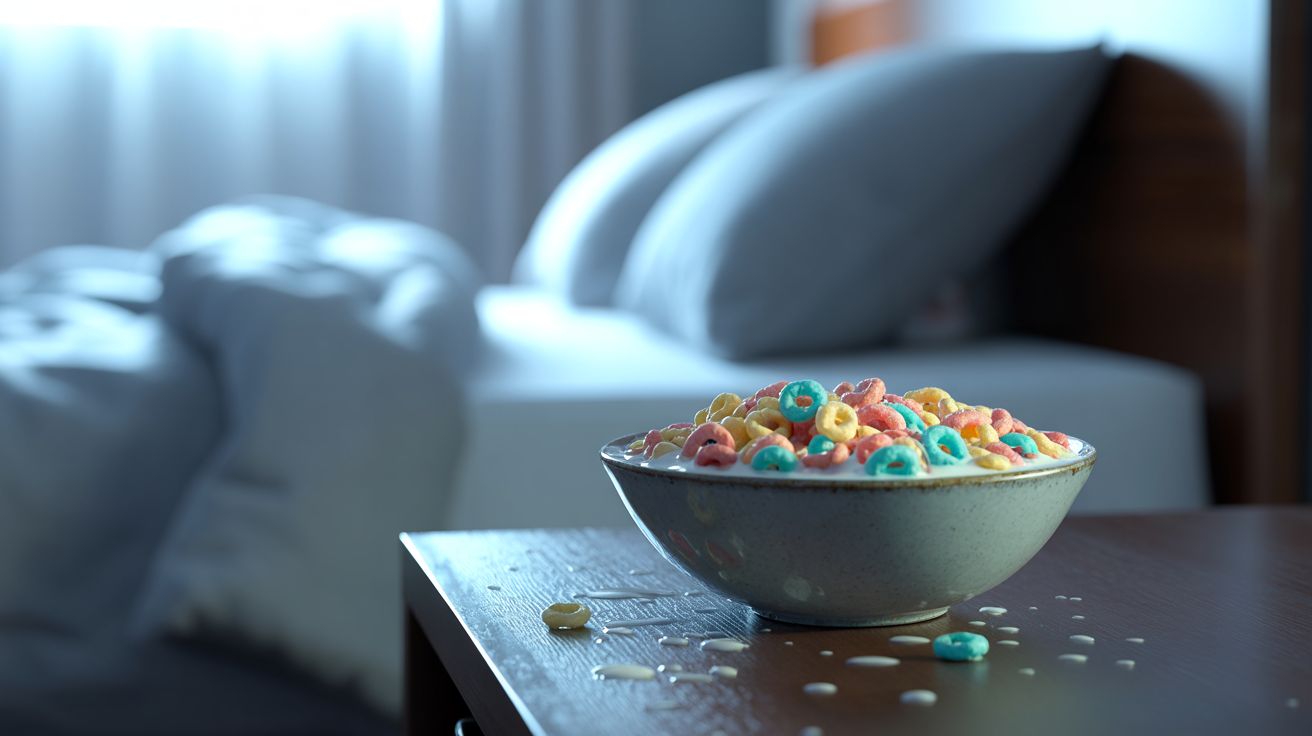
The Midnight Snack That Backfired
Picture this: you’re lying in bed, staring at the ceiling. You’ve been tossing and turning for what feels like hours. You resisted the urge to scroll through social media, knowing the blue light is a sleep saboteur. You even tried counting sheep, but all you managed to do was create a mental farm. What’s going on? You ate a healthy dinner, maybe even a small snack before bed to avoid waking up hungry. But that snack, that seemingly innocent handful of nuts or piece of fruit, might be the very culprit keeping you awake. It’s not always about what you *avoid* before bed, but what you *consume* that can disrupt your sleep cycle.
We often focus on the obvious sleep disruptors: caffeine, alcohol, and screen time. But there’s a more subtle, often overlooked factor at play: your blood sugar levels. The food you eat, especially in the hours leading up to bedtime, can have a significant impact on your ability to fall asleep and stay asleep. Let’s delve into the science behind this and explore how you can optimize your diet for better sleep.
The Blood Sugar Rollercoaster
When you eat, your body breaks down carbohydrates into glucose, which is then released into your bloodstream. This causes your blood sugar levels to rise. In response, your pancreas releases insulin, a hormone that helps glucose enter your cells for energy. This process is usually smooth and efficient, but sometimes, especially with certain foods, it can lead to a rapid spike followed by a dramatic crash. This is what we call the blood sugar rollercoaster, and it’s a recipe for sleep disaster.
Imagine eating a sugary snack before bed, like a bowl of ice cream or a piece of cake. Your blood sugar spikes rapidly, giving you a temporary burst of energy. However, this spike is quickly followed by a crash as your body releases a surge of insulin to compensate. This sudden drop in blood sugar can trigger the release of stress hormones like cortisol and adrenaline, which are designed to help you cope with perceived threats. These hormones can jolt you awake, making it difficult to fall asleep or stay asleep. Even seemingly healthy snacks, if high in simple carbohydrates, can have this effect.
Cortisol: The Unwanted Bedtime Guest
As mentioned, cortisol plays a significant role in the sleep-wake cycle. It’s naturally higher in the morning to help you wake up and gradually decreases throughout the day, reaching its lowest point in the evening to prepare you for sleep. However, when your blood sugar crashes, your body perceives this as a stressful situation and releases cortisol to raise blood sugar levels. This surge of cortisol at night can disrupt your natural sleep rhythm and make you feel wired and anxious.
Think of it like this: your body is designed to be calm and relaxed before bed, but a blood sugar crash throws a wrench into the system, triggering a stress response that keeps you awake. This is why managing your blood sugar levels is crucial for achieving restful sleep. It’s not just about avoiding caffeine; it’s about creating a stable internal environment that promotes relaxation and sleepiness.
The Glycemic Index and Your Sleep
The glycemic index (GI) is a measure of how quickly a food raises blood sugar levels. Foods with a high GI, like white bread, sugary cereals, and processed snacks, cause a rapid spike in blood sugar, while foods with a low GI, like whole grains, legumes, and non-starchy vegetables, have a more gradual effect. Choosing low-GI foods, especially in the evening, can help stabilize your blood sugar levels and prevent those disruptive crashes.
Consider swapping that bowl of sugary cereal for a small portion of oatmeal with berries and nuts. The oatmeal is a complex carbohydrate that releases glucose slowly, while the berries and nuts provide fiber and healthy fats, further slowing down the absorption of sugar. This combination will provide sustained energy without the blood sugar rollercoaster, promoting a more stable and restful night’s sleep. Paying attention to the GI of the foods you eat is a simple but powerful way to improve your sleep quality.
Exercise and Insulin Sensitivity
Regular exercise plays a vital role in regulating blood sugar levels and improving insulin sensitivity. When you exercise, your muscles become more efficient at using glucose for energy, which helps to lower blood sugar levels and reduce the need for insulin. This improved insulin sensitivity can help prevent blood sugar crashes and promote more stable energy levels throughout the day and night.
Aim for at least 30 minutes of moderate-intensity exercise most days of the week. This could include brisk walking, jogging, swimming, or cycling. Even short bursts of activity, like taking the stairs instead of the elevator or doing a quick workout during your lunch break, can make a difference. However, avoid intense exercise close to bedtime, as it can temporarily raise cortisol levels and interfere with sleep. Finding the right balance of exercise and rest is key to optimizing your sleep quality. Remember to consult with a medical professional before starting any new exercise program.
The Role of Protein and Healthy Fats
While carbohydrates have the most direct impact on blood sugar levels, protein and healthy fats also play a crucial role in regulating blood sugar and promoting satiety. Protein helps to slow down the absorption of glucose, preventing rapid spikes and crashes. Healthy fats, like those found in avocados, nuts, and olive oil, also contribute to stable blood sugar levels and provide sustained energy.
Consider adding a source of protein and healthy fats to your evening meal or snack. For example, you could have a piece of grilled chicken with roasted vegetables and a drizzle of olive oil, or a handful of almonds with a small apple. These combinations will help to keep your blood sugar levels stable throughout the night, promoting a more restful and uninterrupted sleep. A balanced diet is essential for overall health and well-being, and it can also have a profound impact on your sleep quality.
Beyond Diet: Other Factors to Consider
While diet plays a significant role in regulating blood sugar and promoting sleep, it’s important to consider other factors that can also affect your sleep quality. Stress, anxiety, and underlying medical conditions can all contribute to sleep problems. Practicing relaxation techniques, such as meditation, deep breathing exercises, or yoga, can help to reduce stress and promote relaxation before bed.
If you’re experiencing persistent sleep problems, it’s important to consult with a medical professional to rule out any underlying medical conditions. Conditions like sleep apnea, restless legs syndrome, and thyroid disorders can all interfere with sleep. A doctor can help you identify the cause of your sleep problems and recommend appropriate treatment options. Remember, addressing sleep issues is an investment in your overall health and well-being. Don’t hesitate to seek professional help if you’re struggling to get a good night’s rest.
Putting It All Together: Your Sleep-Boosting Plan
So, what’s the takeaway? Achieving restful sleep isn’t just about avoiding caffeine and screen time; it’s about creating a stable internal environment that promotes relaxation and sleepiness. This involves managing your blood sugar levels through a combination of diet, exercise, and stress management. Start by paying attention to the glycemic index of the foods you eat, especially in the evening. Choose low-GI options like whole grains, legumes, and non-starchy vegetables. Incorporate protein and healthy fats into your meals and snacks to slow down the absorption of glucose.
Engage in regular exercise to improve insulin sensitivity and regulate blood sugar levels. Practice relaxation techniques to reduce stress and promote relaxation before bed. And if you’re experiencing persistent sleep problems, don’t hesitate to consult with a medical professional. By taking these steps, you can optimize your blood sugar levels, improve your sleep quality, and wake up feeling refreshed and energized. It’s time to ditch the midnight snacks that backfire and embrace a sleep-boosting plan that works for you. Your body (and your mind) will thank you for it.


